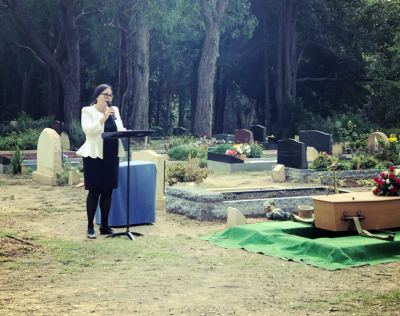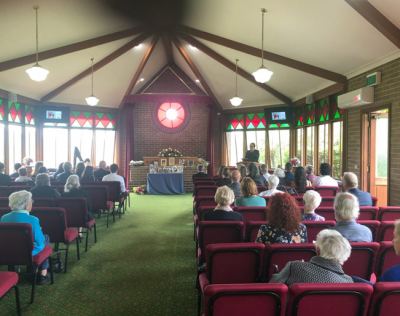How many of us can say that we know what we want our funeral to be like, let alone making those decisions for a loved one’s funeral? We plan all sorts of things throughout our lives; holidays, weddings, buying a home, even going out to a restaurant. We do our research and work out the best possible options. Yet, when it comes to something that happens to all of us, we tend not to want to think about it until it happens. But knowing what your loved one wanted for their funeral goes a long way to creating the perfect send-off. Unfortunately, all too often, I have conversations with loved ones who are at a total loss on what their loved one would have wanted.
I remember one such conversation with a family who had recently lost their patriarch. Ronald was 87 years old when he passed away. He was a decorated WW2 serviceman, and a long-time member of the Masons and Rotary clubs. Ronald spent his last two years in a nursing home battling cancer.
The funeral director had given me Ronald’s son’s details, and I was on my way to meet him in the family home. When I arrived at the modest two-story house, I took my briefcase – filled with books, memorial cards, and my lengthy questionnaire – from the car and went to meet the son.
Upon arrival, I offered my condolences.
‘Your father had been sick for a while?’ I asked.
The family nodded through their sobs.
‘Did you, by chance, ask him what he would like done for his funeral or what he wanted his funeral song to be?’
The family looked at me like I’d said something vulgar. ‘Are you kidding me, we couldn’t talk about anything like that!’ they responded.
In an ideal world, where it is easy to speak about death, most families would know what their loved one would have wanted. But this isn’t always possible.
There are a few things to consider when planning a funeral, but the two most important things that need to be decided once a person dies, either by the family or the deceased’s last wishes are:
- Burial vs. Cremation
- Funeral vs. Memorial
Burial vs. Cremation
The most significant decision would be whether your loved one wants to be buried or cremated. Often their funeral ‘desires’ are written into their last Will, so it is important to be aware of this. A family once came into a funeral home in my local Blue Mountains and wanted a cremation for their father, as it was the cheapest option. They had the funeral, and a week later, the Will was read out. In their father’s Will, it clearly stated that he wanted to be buried. It is vital to understand that the Will is often read after the funeral.
Even without a will, for some families, it is pretty straight forward, and they know what they want. Religious families are often very clear about their loved one’s wishes, according to their belief structure. Some families still have family plots, and if this is the case, then it is pretty clear that burial will be chosen.
Some loved ones are very clear about what they want when talking to their family. Your loved one might say, ‘Don’t worry about me and get on with it.’ I’ve also heard people say, ‘Just roll me out with the trash’ – which might be in jest but the funeral or memorial is for the people left behind.
Burials:
If you have chosen burial for your loved one, you have a few options available to you and some decisions to be made. It’s essential to know whether there is an existing pre-purchased plot, or whether the deceased had specific wishes about their burial site, or whether you wish to bury them near other deceased family members.
Burials are more expensive than cremations with additional expenses to think about – masonry work, maintenance fees, etc. In Australia, the average price for burial is around $15,000–$20,000.
But, the advantage of burial is that there is a place that you can go to visit your loved one and it also serves as a historical marker.
If you choose burial for your loved one, first you’ll need to consider where you’d like your loved one buried. There are different options available, including:
- Lawn cemetery with memorial plaque
- Council-owned cemetery
- Privately-owned cemetery
- Natural cemetery
Your Funeral Director will be able to inform you of the various burial sites available and the different costs and requirements for each.
When you buy a burial plot, you are only purchasing the right to be buried (or interred) on the land. You are not buying outright title to the land itself. Keeping this in mind, it’s important to understand that the right or licence may only be for a fixed period, such as 25 or 50 years. After this time expires, a family member will be allowed to renew the licence for a further term. If you want to purchase a cemetery plot that will remain forever (without additional payments), make sure you confirm with the funeral director that the right of interment is for a perpetual term.
It is also worth considering whether the burial site will be visited and by whom – is the gravesite convenient for all loved ones to visit? My father was buried over 20 years ago in a military cemetery in Texas. I’ve only visited twice.
Cremation:
Cremation is the preferred choice in Australia with cremation rates over burial at 69%. It is a far more economical option than burial. Cremations tend to start from $6000–$10,000. There is also the option to keep costs down even further by requesting ‘no service or attendance’.
The main disadvantage of cremation is that there is no permanent historical marker for loved ones to visit, but this can be alleviated by having ashes interred at a cemetery. The benefit to having no fixed place for your loved one to rest include:
- You can scatter the ashes in places wherever your loved one had their fondest memories;
- You can divide the ashes amongst loved ones;
- Ashes can be inserted in a memorial cremation locket;
- Ashes can be made into a gemstone;
- Ashes can be infused into a crystal;
- Ashes can be placed into a biodegradable urn and placed in the earth alongside a newly planted tree or plant.
An important note: If your loved one has a pacemaker or similar device, then this will need to be removed by a doctor prior to the cremation. The funeral director will arrange for the removal. Battery-powered devices must not be placed in the coffin with the deceased – even, for instance, if you wished to include a much-loved battery-powered watch as a part of their final outfit. These conditions are necessary for the safety of staff at crematoria and, indeed, the dignity of your loved one, should there be any adverse reactions.
Funerals vs. Memorials
Funerals and memorial ceremonies are not for the dead but the living. It is a significant opportunity to be able to come together, honour your loved one, and support those left behind. Very often, the final celebration is ‘designed’ and organised by the loved one’s family. On occasion, I have been able to meet with someone just before their passing and discuss their wishes for their final ceremony. In one instance, an elderly lady told her daughter and me that she wanted her funeral ceremony held in a beautiful garden. The funeral was held in her daughter’s backyard a week later, with a cardboard coffin on which the grandchildren were able to write or draw their last goodbyes.
It is crucial to have family and friends come together, share stories, cry, and comfort each other. Whether this is a funeral conducted with your loved one’s body present or whether a memorial service is at a later date, it is vital to have some sort of ceremony.
Funeral: Burial
There are many options for how your loved one’s burial ceremony can take place. Whatever option you choose, in most cases, the funeral staff will transport the coffin/casket to the cemetery in a hearse.
Option A
Have the ceremony at a venue/chapel then the deceased is brought to the cemetery afterward.
- Coffin/casket is placed in the hearse, with a funeral cortege procession to the cemetery. All guests are invited to go to the cemetery, where the ceremony is concluded graveside.
OR
- You can choose to have a simple, private family farewell at the graveside before re-joining all other attendees at the reception.
OR
- The funeral staff can take your loved one to the cemetery with no one in attendance, where the coffin will be lowered in respectful silence, and the grave closed. You may wish to visit later that day or the following day.
Option B
The ceremony can take place at the cemetery, at the graveside. Often the funeral director or the cemetery can provide a canopy, some chairs, microphone for the celebrant, music facilities and speakers and a memorial table, water refreshments, and other elements.
Some reasons you might consider having the ceremony at a venue, instead of the ceremony at the graveside include:
- A photo slideshow with accompanying music can be shown.
- The gravesite is located in a challenging spot. For example, a long-distance walk or situated on a hill.
- Several elderly or immobile guests will be in attendance.
- The gravesite does not accommodate a large number of people.
- There is no need to worry about the weather extremes.
In most cases, a hearse will drive the coffin/casket to the cemetery. However, if your loved one was a keen motorcycle driver, a motorcycle hearse can take your loved one to their final resting place. Horse-drawn hearse carriages are also sometimes used.
Funeral: Cremation
Most families who choose cremation have the ceremony in the venue at the crematorium. The family will need to decide whether they want the curtain closed at the end of the service. It’s a very personal choice, and every family is different. If the curtain is closed, I usually recommend that there is a reflection time that allows guests to approach the coffin and say their private goodbye. Being able to touch the coffin does bring comfort to some people.
However, some families choose to have the ceremony at a more fitting venue, for example a park, beach, hotel, RSL, golf course. Of course, the funeral director will have to check on the logistics and appropriate authorisation of where you want a ceremony held.
I worked with one family, whose mother was a keen golfer, so there was no other place to have the funeral than at the 18th hole at a local golf course. On completion of the ceremony, the hearse took the coffin to the crematorium for a private cremation.
The family can also choose to have no attendance and no ceremony at the crematorium. After the cremation has taken place and ashes have been collected, a memorial service can be organised at a later date.
Memorial Service
There are many reasons to celebrate the life of a loved one through a memorial instead of a ceremony, these include:
- If most of the family live interstate/overseas or timing doesn’t allow for proper planning.
- Some families would rather not have their loved one’s body at the service and prefer a photo and maybe the ashes presented in an urn, which can be made of ceramic, bronze, or wood.
- Families who choose this option would have had a no attendance/no service cremation (the most inexpensive option for cremation) and would need to pick up the ashes from the crematorium or even a private burial.
- In some situations, a memorial is the only option available. As sad as it seems, there are situations where no bodily parts remain or are found. Also, in some circumstances, individuals have pre-arranged to donate their body to medical research, and sometimes this is not completed for many weeks following the death. However, to facilitate the commencement of the grieving process, a memorial service can be held promptly.
At a memorial, the family can have the ashes placed in an urn with a photo displayed at the front of the ceremony space. A memorial table might also be set up with your loved one’s memorabilia – craft items, trophies, scrapbooks, etc. A memorial could take place at any number of venues, including a hotel reception room, chapel, park, beach, golf course, school hall, backyard, etc.
Ashes Internment
Many families opt for cremation so that they can scatter the ashes in meaningful and memorable spots. This action commemorates their loved one by retracing their happiest moments. For many, there is no more profound way to honor a loved one’s memory.
In the last few years, I’ve been involved in a few ‘interment of ashes ceremonies’ at local cemeteries, in which a designated area is allocated for permanently placing the ashes, either within a columbarium niche or directly into the ground. A memorial plaque with your loved one’s name would be displayed.
There is value in having a loved one’s ashes in a permanent resting place. It allows the family to visit at any time, reflect, and even find comfort to celebrate good news and to share. As human beings, we crave physical closeness with our loved ones.
Having something to touch – a marker, a plot of soft grass – connects us to the loved one’s essence and can help make the separation feel less final.
Final things to consider
It is crucial to have an open discussion with your loved ones about the end of your life choices. Even if you don’t feel strongly about any decision, let your family know. This information will empower them. It is also, essentially, the last gift of love that you are giving to your loved ones.
In hindsight and knowing what I know now and because of the close relationship I had with my father, perhaps a cremation would have been my preference. Then I could have a few ashes of my dear dad placed in an urn or piece of jewellery (locket) and kept close to my heart.
Some sort of celebration is an important event to honour your loved one’s life. It also provides an opportunity to come together as a community to validate your grief.
In the near future, when I ask a family what their loved one wanted for their final celebration, I hope it will be a resounding, ‘My father definitely wanted to be cremated, with the ashes divided amongst the children. He didn’t care about a ceremony, but if we had one to play this song…’
In summary, burial is the most expensive option, but if the family has a plot or specific religious beliefs, this might be the only option. At a funeral I did years ago, the daughter confided in me that her mother had a fear of fire, so the only option for the family was a burial. It’s essential to think about how often the gravesite will be visited. The best advantage of having a burial is that there is a historical marker.
Cremation is the most popular option, and I find it symbolic in scattering the ashes at various places where your loved one had their fondest memories. The ashes can be divided and contained in either jewelry, an urn, or even interred at a permanent resting area.







